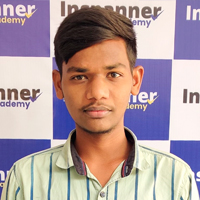Java Training In Hyderabad
 5 star rating
5 star rating  3,000 Learners
3,000 Learners
Inspanner Academy is the Best Java Training in Hyderabad. During the Java Training Course you work on real time projects and applications and become an expert Java web developer. Get 100% practical training with guaranteed placement assistance. We are one of the leading institutes in Hyderabad with 100% positive reviews on the internet.Students are made to work on real-time projects as part of the course and will be given job placement assistance in the top IT companies.
This course will transform you from a beginner to a java developer. The course starts with the basics of Java , all front end technologies like HTML5,CSS3,Javascript, Bootstrap 5.0 and will advance to next level modules like Servlets, JDBC, JSP, and enterprise modules like Spring, REST APIs.
Java leads Software Industry in Development Projects from over decades because it is an Open Source language, Platform Independent and Huge Community Support Portals. This course primarily focuses on learning JAVA related technologies.
Technologies :
- FrontEnd Technologies – HTML, CSS, JavaScript, HTML5, CSS3,JQUERY, RESPONSIVE DESIGN
- Core Java – Java Programming Language
- Advanced Java – Covers Servlets, JSP, JSTL, EL etc., required to build Java J2EE Web Applications
- Spring Boot Framework – Most Famous Java Framework to help maintaining and develop large Java based Applications
- Hibernate Framework Java based ORM Framework to make your java applications data based independent. Check details in their respective courses
- Multithreaded: It supports Multithreading to perform several tasks simultaneously within a program.
Java Developer Course
Are you searching for the Best Java training institute in Hyderabad? Inspanner Academy is the Best Java Training in Hyderabad and Full Stack Java Training in Hyderabad.Inspanner academy provides you the Best Core Java training in Hyderabad.
Our course helps you get extensive knowledgein understanding JSTL, custom tags and expression language to minimize java code in web pages. We mainly highlighton imparting practical learning to the student rather than theoretical knowledge.
We provide one-to-one classroom training to ensure our students understand the JAVA concepts thoroughly. Our modules will help you understand/learn java from beginner level to advance level.
Provide more and more quality training to students by our experts and be the BEST SOFTWARE TRAINING INSTITUTE IN HYDERABAD.
Key Features

Training from
Industrial Experts

Hands-on
PRACTICALS/PROJECT

100% Placement
Assistance
Assistance

24 x 7
Expert Support

Certification
for Course

FREE
LIVE DEMO
LIVE DEMO
Core Java TRAINING Content
Section 1: Introduction
- Introduction about Programming Language Paradigms
- Why Java?
- Flavors of Java.
- Java Designing Goal.
- Role of Java Programmer in Industry
- Features of Java Language.
- Installing Java
- Difference between JDK,JRE and JVM
- JVM –The heart of Java .
- Java Architecture
- Java’s Magic Bytecode.
Section 2: java sample program
- Java Program Development.
- Java Source File Structure.
- Compilation & Execution
- Rectifying common errors
- Lexical Tokens
- Identifiers
- Keywords
- Literals and Comments
- Command Line Arguments
Section 3: Programming fundamentals
- Data types
- Difference between Primitive & Non Primitive Datatypes
- Variable Declaration & Initialization
- Type Casting
- Operators and its types
Section 4: Control Structure and Looping statements
- IF conditions
- IF-ELSE conditions
- Nested IF conditions
- ELSE-IF Ladder conditions
- SWITCH-CASE statements
- The “break” and “continue” keywords
- “FOR” Loop
- Different forms of FOR Loop
- “WHILE” Loop
- “DO-WHILE” Loop
- ENHANCED “FOR” Loop
- Nested Loops
Section 5: OOPS INTRODUCTION AND BASICS
- What is OOPS?
- Necessity and Advantage of OOPS
- OOPS Designs with real-time examples.
- What is mean by class and object?
- Relation between a Class and an Object
- How to create class and object
- User-defined / Custom Datatypes
Section 6: OOPS BASICS (CLASSES & OBJECTS)
- Components of a Class
- Types of Variables and its uses.
- Method Advantages, Categories and Types
- Constructor advantages and its types
- Ways to initialize the Object
- “this” keyword
- Static Block & Instance Block
- Nested classes
Section 7: OOPS CONCEPTS – INHERITANCE
- Inheritance and its advantages
- The “extends” keyword
- Types of Inheritance
- Single Inheritance
- Multilevel Inheritance
- Multiple Inheritance
- Hierarchical Inheritance
- Hybrid Inheritance
- Difference between IS-A and HAS-A relationship
- Use of “super” keyword and forms of “super” keyword
Section 8: OOPS CONCEPTS – ABSTRACTION
- Abstraction and its advantages
- Abstract Class and Abstract Methods
- The “abstract” keyword
- Implementation of Abstract Methods
- Uses of Abstract Classes
- Interface and its advantages
- ‘implements’ keyword
- Achieve Multiple Inheritance with Interface
- Difference between Abstract Class and Interface
Section 9: OOPS CONCEPTS – POLYMORPHISM
- Polymorphism and its advantages
- Types of Polymorphism
- Types of Binding
- Method Overloading and its uses.
- Conditions of Overloading
- Method Overriding
- Scenario of Overriding
- Difference between Overloading and Overriding
- About Class Casting
- About Design Patterns.
Section 10: OOPS CONCEPTS – ENCAPSULATION ALONG WITH PACKAGES
- What is package and its advantages
- Types of packages
- Static Import
- Access Modifiers
- Encapsulation
Section 11: ARRAYS AND STRINGS
- What is Array and its advantages
- Types of Array
- Jagged Array
- String, String Buffer, String Builder
Section 12: LOGICAL PROGRAMMING ON ARRAYS AND STRINGS
Interview related logical programs:
- Rotate the Array Elements
Input – {1,2,3,4,5}
Output – 5 1 2 3 4
4 5 1 2 3
3 4 5 1 2
2 3 4 5 1
1 2 3 4 5 - Sort the Array using different algorithms. (Bubble Sort, Selection Sort, Insertion Sort, Quick sort, Merge Sort)
- Searching the value in Array (Linear Search & Binary Search)
- Find the Median value and Mode value in Array
- Find the Second highest and Second smallest value in array
- Find and print the duplicate elements in array
Section 13: LOGICAL PROGRAMMING
Interview related logical programs:
- Display Prime Numbers, Armstrong numbers, Perfect Numbers, Strong Numbers up to range or between the ranges
- Sum of Digits/ Reverse a number
- Convert decimal number to binary format
Section 14: EXCEPTION HANDLING
- What is Exception and its types
- How to handle exception?
- Multiple catch blocks
- Finally block
- Difference between throw and throws
- Custom Exception
Section 15: JAVA UPDATED FEATURES AND OOPS MISC
- Varargs
- Autoboxing and Autounboxing
- EnumType
- Annotation
- Custom Annotation and its types
- Assertion
OOPS MISCELLANEOUS
- Object Class
- Object Cloning (Shallow Copy and Deep Copy)
- Wrapper Class
- Java Recursion
Section 16: IO PACKAGE
- Stream and its types
- Read, Write and Copy Files
- Serialization
- Marker Interface
- “transient” keyword
Section 17: DATABASE
- What is Database?
- What is MySQL?
- Parts of MySQL
- Operators and Clauses in MYSQL.
- Functions and procedures in MYSQL.
Section 18: JDBC
- What is JDBC?
- Types of Drivers
- Loading the drivers
- Connection, Statement, PreparedStatement, CallableStatement, ResultSet Interfaces
- Batch Updates
Section 19: MULTITHREADING
- What is multithreading and advantages.
- What is Thread?
- Life Cycle of a Thread.
- Thread Classes and Methods
- “Runnable” Interface
- Creating Thread
- Working with multiple Threads.
- Java Synchronization
- Interthread Communication
- Dead Lock
Section 20: UTIL PACKAGE
- Regular Expression
- String Tokenizer
- Scanner & Date Classes
- Localization & Internationalization
- Java Collections Introduction
Section 21: UTIL PACKAGE – COLLECTIONS FRAMEWORK
- The “Collection” Interface
- List, Set and Map Interfaces
- Cursors in java and its differences
- Difference between the implementation classes of List, Set and Map
Section 22: GENERICS IN COLLECTIONS FRAMEWORK
- Generics in Java
- Types of Generics
- Uses and Limitations of Generics
- Custom objects with Generic collections
- Sorting in Collections
Section 23: NETWORKING & SWINGS
- Basic terms in networking
- Socket Programming
- Introduction about Swings
- Components in Swings
- Events Handling
Section 24: ECLIPSE FEATURES AND LATEST JAVA VERSION FEATURES
- Default and static method in an interface
- Functional Interfaces and Lambda expressions
- Collection API improvements
- Concurrency API improvements
- Java IO improvements
- Working with Eclipse
- Eclipse shortcuts
- Debugging
- Code previous history
Book your FREE DEMO session for the Best Core Java Training.
Queries You may have
Our Best Core Java Course Duration is 40 to 50 hours. In this duration, we will give you more Core Java programming examples. You will get various levels of Core Java assessments. You have to work on a real time Core Java Project.
After completion of your Core Java Training, You can develop any levels of Core Java projects professionally.
Didn’t find the Answer?
Job opportunities in Core Java ?
Why Inspanner?Inspanner academy has been reviewed as the Best Java Training in Hyderabad Hyderabad and India. We follow one to one communication methods in our teachings to make sure our students understand every topic thoroughly and effectively. Our faculty have ample experience in the industry; hence they will mold you as per industry expectations are requirements.Inspanner Academy is the Best Java Training in Hyderabad and Full Stack Java Training in Hyderabad.Post the training, we guide our students to get a job in the respective field. We nurture your programming ability to withstand the competition in the market.
Get placed as a Software Developer- Java Full Stack Developer Course .
| Date | Timing | Schedule | Venue | |
|---|---|---|---|---|
| NOV
11
2018
|
10.30am-12.30pm | Week end | Velachery |













